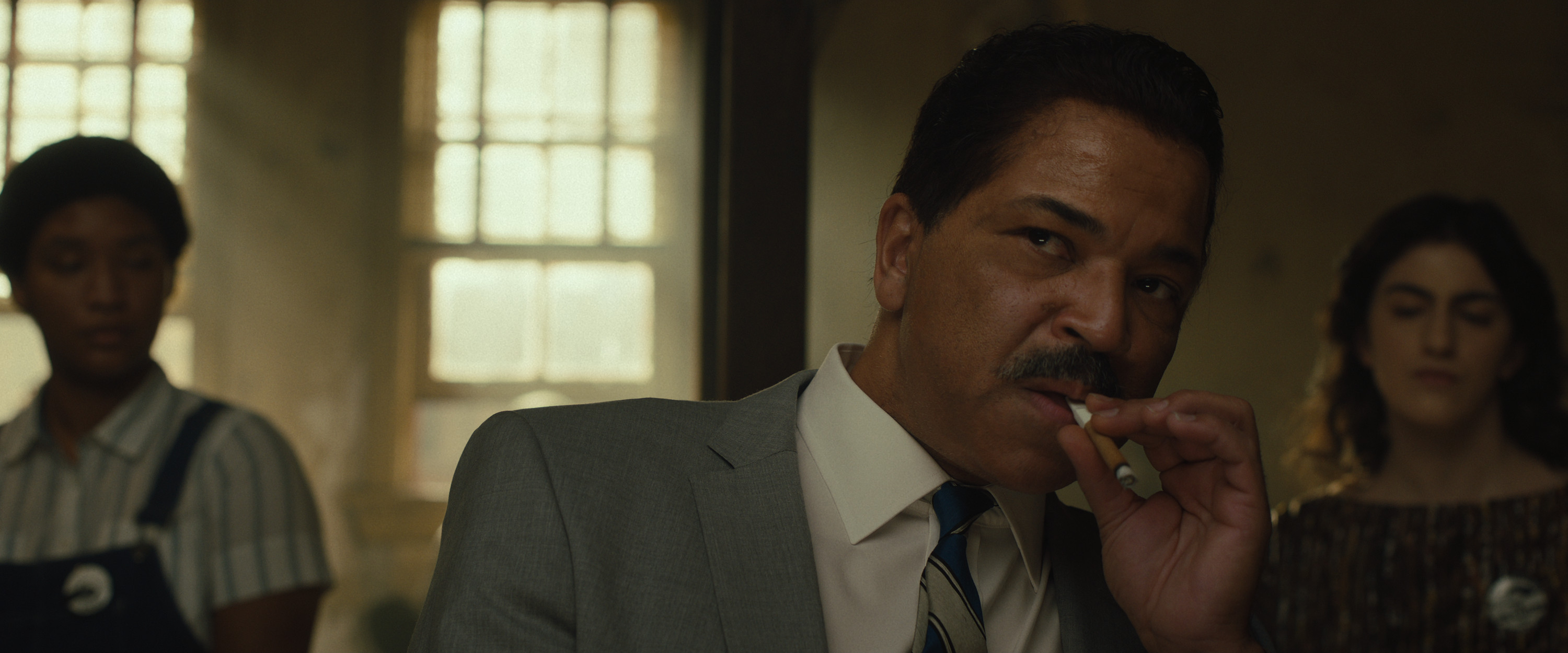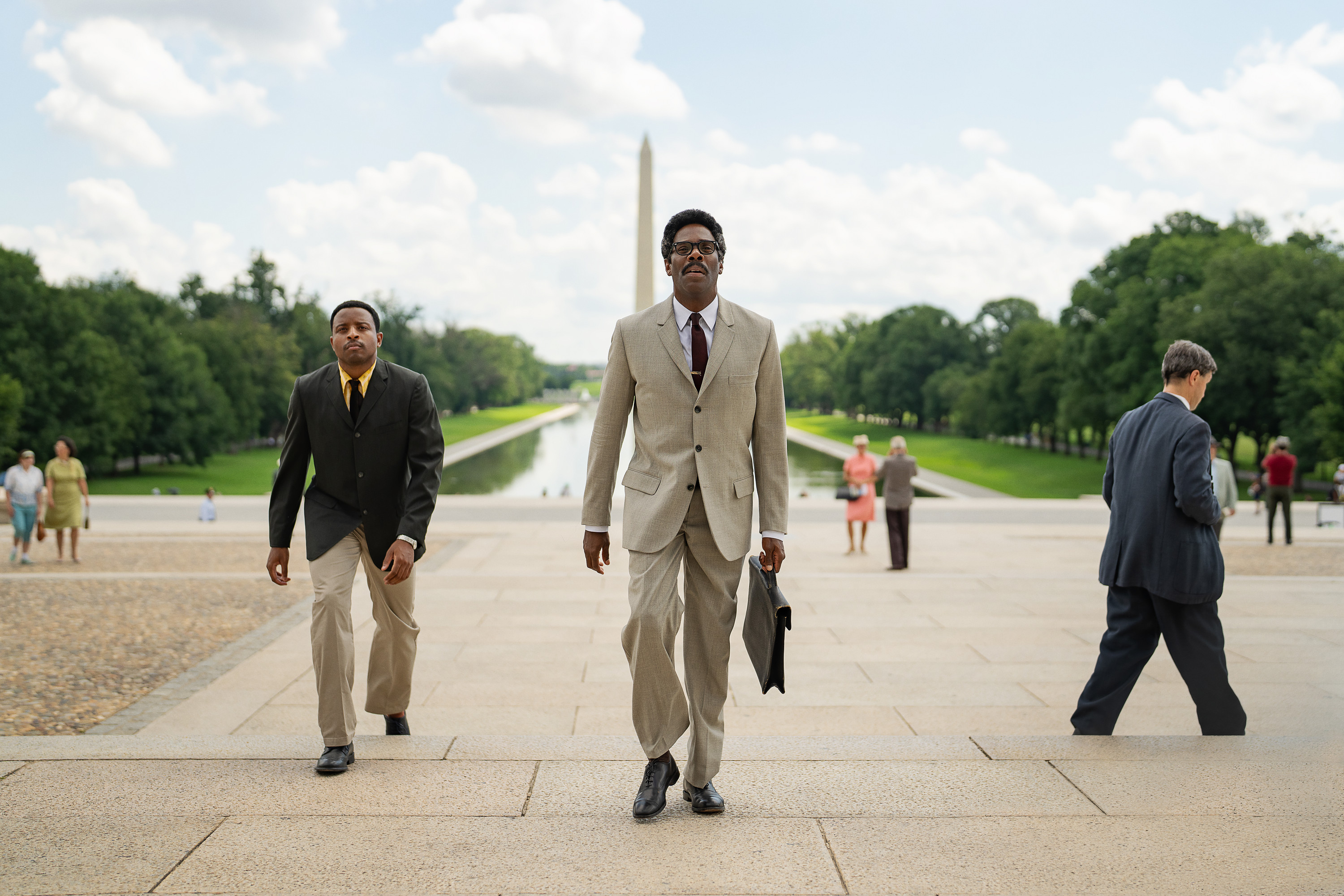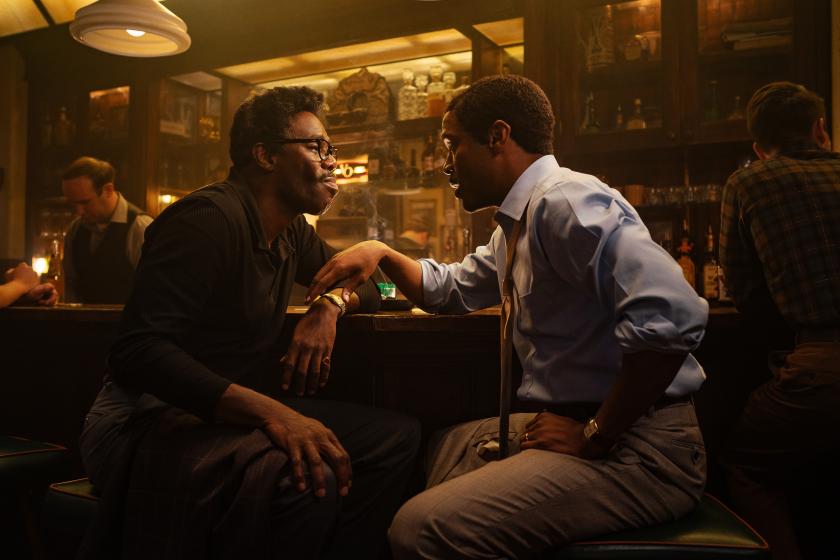King (Aml Ameen) is a cautious rising star here, a flawed figure who betrays Rustin early on, as his sexuality proves his Achilles Heel to Civil Rights movement enemies including the NAACP’s Roy Wilkins (grizzled Chris Rock) and black Congressman Adam Clayton Powell (Jeffrey Wright, pictured below). Produced by the Obamas’ Higher Ground company, after President Obama posthumously awarded Rustin the Presidential Medal of Freedom, and directed by Ma Rainey’s Black Bottom’s George C Wolfe, intimations of worthiness are undercut by Rustin’s exuberant and sensual character.
A former high school sports star, conscientious objector and singer, Rustin is 51 in 1963 and washed up on the Movement’s fringes, “a shark trapped in a damn shot glass”, his friend Ella Baker (Audra McDonald) rails. Then, at a tumultuous moment which results in his friend Medgar Evers’ assassination, he takes the reins of a rapidly conjured mass march to drive home the wavering JFK’s Civil Rights Act. Domingo’s Rustin is a bullishly big man softened by sudden grace, his rhetoric confronting then consensual. His unabashed sexual force makes an affair with married clergyman Elias (a composite character played by Johnny Ramey) tremulous with love and lust, though confined to noir street corners and bars, under the shadowy paranoia of FBI surveillance. Hardly the only gay black person at the Movement’s heart (think of James Baldwin and Billy Strayhorn), his sexuality nevertheless leaves him impeded and relatively anonymous, the unacknowledged limp in his brazen stride.
Domingo’s Rustin is a bullishly big man softened by sudden grace, his rhetoric confronting then consensual. His unabashed sexual force makes an affair with married clergyman Elias (a composite character played by Johnny Ramey) tremulous with love and lust, though confined to noir street corners and bars, under the shadowy paranoia of FBI surveillance. Hardly the only gay black person at the Movement’s heart (think of James Baldwin and Billy Strayhorn), his sexuality nevertheless leaves him impeded and relatively anonymous, the unacknowledged limp in his brazen stride.
Rustin also loves King and his country. King’s eventual support of his friend reveals the heavy weight of his earlier pragmatic treachery, as repressed relief visibly floods Rustin’s body and soul. As to America, its viciously racist nature is shown in Wolfe’s montage of hate-twisted white faces as black children innocently desegregate schools, and Rustin’s bone-cracked bludgeoning from the front of a bus. This thorny reality is acknowledged if understated in Julian Breece and Dustin Lance Black’s script. “We forgive, by trying to make things right,” Ella Baker tells Rustin, potent sacrifice of a piece with the non-violence he learned in India and passed on to King, and the “exalted rage” this Quaker finds in Baptist church music. Baker’s exchange with Rustin is one of the film’s many scenes of quiet talk in black apartments and bars, a textured milieu deepened by Branford Marsalis’s soul-jazz score, vibrant with the hip possibility of 1963 Harlem streets.
Baker’s exchange with Rustin is one of the film’s many scenes of quiet talk in black apartments and bars, a textured milieu deepened by Branford Marsalis’s soul-jazz score, vibrant with the hip possibility of 1963 Harlem streets.
The March itself is rousing but anti-climactically brief, focusing on Rustin’s role in King reaching the point where his magnificent sermon can prick America’s conscience. The Obamas’ hand can perhaps be felt in the almost platitudinous end. Wolfe, whose important theatre career dwarfed his films till Ma Rainey’s Black Bottom, can’t escape biopic cliches, as real life’s inevitable progress dulls imagination. His and Domingo’s love for their subject anyway powers a sufficiently complex character study, and resurrects an exemplary American hero.















Add comment